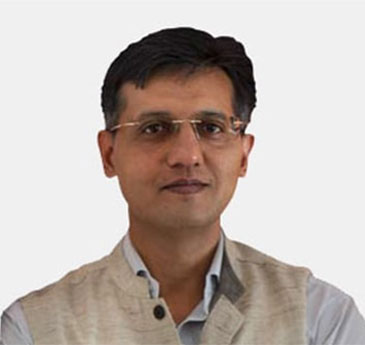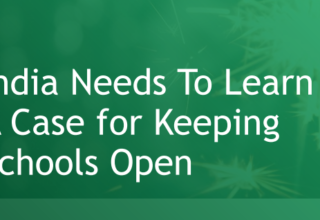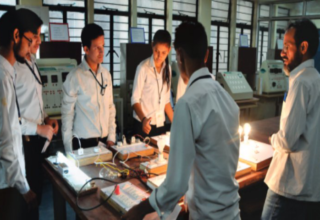
Rethink education is already shaping a new education delivery order. Among the new age young universities in the country is Jaipur-based JK Lakshmipat University (esb 2011) offering technology as well management courses. Autar Nehru spoke to Asheesh Gupta, Pro Vice-Chancellor, JKLU, also a former Consultant at McKinsey & Company and Director of McKinsey’s Knowledge & Research Centres in India to get a pulse of what are education leaders thinking about the COVID-19 impact.

We are in an extraordinary situation because of COVID-19 pandemic; there is disruption, uncertainty, anxiety and also a lot of rethink particularly about higher education. So, tell us how do you see this situation and what was your initial reaction?
By and large different institutions have responded differently to this crisis, some are essentially posting material and encouraging students to read it and giving assignments, in some places they are just putting presentations and notes for students to complete their course. And some like us have taken proactive route by saying how do we actually deliver teaching online. Fortunately, we had technology and preparedness, faculty so we have been able to do that and kept our classes going online. Between our three institutions, on an average, we deliver 50 classes and session a day to our students. In any case a lot of our lectures and project work was already in this mode.
Was there any binding communication from regulators like UGC or AICTE?
Both these regulators have been quite mindful of that the reality that different institutions are different levels in academic delivery and even preparedness to switch over to online, so there was a notification listing the available online resources and how to make use of time during lockdown. It was a kind of right guidance and an advisory.
What AICTE did was that it conducted sessions for educators on how to conduct online classes etc. That is the big missing piece. Content is there but the question is how to make people adept at using it in engaging manner. So I think there is one thing they can do more of, is just that. This is a great time to help faculty to overcome the gaps and hesitation.
Share how it feels in lockdown and this ‘new normal’ and technology scenario?
We’re probably the first institution in the country to do things in design online to the extent, it is possible. Of course part of it is still experiential, people have to make and built things but our students are doing that kind of work at home. They are getting coached, getting demos, they are making presentations. We have taken some of these steps for the first time but for other courses, some of it was already happening. For BTech courses, we are doing programming courses online, same in case mathematics, statistics, mechanical engineering and others. In fact, 80% of our courses are running online. However, for lab part (practicals) we would want students to come back to work on equipment even though there are computer-based simulators. Our belief is that we should not completely rely on these virtual simulator labs and hopefully the lockdown will get over and students will be able to do that.
We are using Zoom as a platform, Google Hagout etc depending on the size of class, For media we are relying on TCSion system. And, it is working very well.
That is very good. But let’s come back to the question of the impact that this lockdown and scare has done to higher education sector. How do you read the general impact?
Truly, this is a sort of watershed for higher education. I think never before in history has anything of sort happened so quickly in terms of impact on higher education. The move to go online is one big part. Globally we partner with several universities. And what we are hearing is that globally institutions are putting together programs for online mode.
There are lots of international students. Even if local movement is allowed, international mobility and travel will take much longer. That is there. So some universities have already declared that there next semester is going to be online. What impact will it have on very very expensive global universities, remains to be seen. It may have impact on how students look at fee, enrolment etc. So I think global education is in big flux.
In India my sense is that even if takes three months to get back to new normal, we have the cushion of summer vacation. Most of us are looking at leveraging that to catch up. We try to ensure that disruption for students is as minimal as possible. We are anticipating, the next semester may become slightly a longer but we should be able to catch up in terms of student’s delivery. Other important thing to get impacted is placement but in the short term or immediate term we are likely to see companies reviewing recruitment policies so on.
So, are you indicating that trends of 2008 meltdown will probably repeat?
Yes. One thing I am worried about is companies deferring placements, deferring joinings. If you remember meltdown 2008, lot of people were given deferred joining dates, people were sitting on benches. Waiting for job offers for months even from large companies were just holding off. One part of our job is preparing for that. If students across intuitions are forced in a situation like that the how do we help them, how we make sure they continue to develop productivity and use their time well.
A lot of our students were going overseas for higher education particularly to USA, how do you see the trend changing with COVID-19 devastation?
In US they are prioritizing economy and commerce over life. Businesses there will bounce back quicker and faster. And universities are proactive there, many of them have a strong online arm, they will accelerate, they have resources. They have money, faculty to do this in offline/online mode. People who have got admissions in top institutions will not get impacted much but people in second and third tier will and they have to be reassessed. People are looking at jobs after study and tier 2/3 jobs will also get impacted, so that is a big thing.
Among a chain of processes, admission process is also impacted. So as a university, how are do looking at admissions?
There are delays. JEE main is being postponed to May. CBSE exams are getting postponed. In our scheme of things NID exam is important, they have conducted the exam but not declared the results as yet. I think yes there is a lot of uncertainty in the minds of students about how they would perform in these exams but as far as we are concerned our belief is unless things take a very drastic turn, things would stabilize and summer vacation is long enough time to catch up with whatever is needed, so we are continuing to go with our initial plan of starting academic year in mid July. Our admission process is therefore on, in some cases where students are waiting for exams of course we are seeing a delay in decision making but our plan is to start as decided for July.
Let’s hope this unprecedented situation normalizes quickly, but at the same time most parents and students are a lot anxious and looking uncertain given the dimension of the pandemic and massive impact it has over lives, economy. What would you say to them?
I am doing that quite a lot because parents are reaching out. We are talking to them. My advise to them is you have to look at them through two lenses—microscope and then telescope. Macroscopic view matters for students who are passing out at this stage, so there they have thinking jobs, some were looking at startup, some were looking at higher education. All these three decisions need to be reviewed at this time. It may not be the best times to jump into something new say a startup. Some of the models people had thought about and developed (I know because we have an Atal Incubation Centre and startups) will take a big hit. So I think people need to be conscious about what startup at this stage means. In terms of higher education, particularly people looking at global universities, you have really to reevaluate it whether they are moving online…where you should go…people should really see at this time in terms of placement.
The students and parents of students who are planning to join a new course or are in say their second year need to take a long term view. Degree education is not a vocational course of three months or six months, so if are taking a 4-year perspective for BTech or 2-year perspective for MBA, they need to understand that education system is sufficiently resilient, humanity has to grow, things will come back and therefore education is not losing its value and going anywhere. Don’t let shorter thinking come in the way of longer term. One thing more Government spending is going up and if really goes up in education, then you know in that case more opportunity will come. This too shall pass… in words of Khalil
Amen. As I said in the beginning, this is also about a rethink on education. So in term of student choices, what kind of trend do you foresee?
We know, trends were moving in a clear direction by the way. For instance there was student movement in specialization, people looking at new emerging areas, interdisciplinary learning opportunities, looking at sharper and more sort of industry connected programs—all was happening anyway. More students were choosing at micro level to take say computer science. But I think, what the emerging situation will do is actually accelerate some of these trends.
This is a discontinuity. Just step back and see where we are going. So otherwise what would actually have happened in 2-3 years will be accelerated in my view in 6 months to a year. And this in a way is good because students will have the opportunity to move to new things faster. And institutions which have not been preparing for the change or not changing will get impacted. They will be forced to change quickly. Somebody was doing well, they were saying why fix something not broken. But this is breaking everything, which anyway we all knew was waiting for a change. People knew students are learning now differently, online was a new way of efficient learning already in the world but people were not adopting them. Now suddenly you have a situation where you’re forced to do that. You will see more and more universities looking at new programs, rejigging their mix, in terms of how much capacity, seats, etc. I think the demand for faculty who have moved with times, will become more valued. So we are in for an interesting one year of this adjustment.
Do you think some of the regulations also need to change with this extraordinary shift?
My belief is, people say all sort of things about our regulators, They are all well meaning people. Regulations are meant for institutions to prevent malpractices and those whose intent is not right. Regulations for stopping such things then apply to everybody. From my own experience of working with regulators in last 8-10 years is that they are supportive of universities. At the same time, my hope is as universities and institutions will need to change rapidly or get accelerated, some of this acceleration also has to happen to regulations particularly the move to go online. Also, because people also misused it online in the past, that is one area, where I am hoping would get a thorough relook rather than one size fit all so that ability of institutions like us who are young, wanting to do things differently or looking at what is best not only in India but also world can think about that. Also, the ability to offer more and more stuff in hybrid mode is what will set it off. Today that is difficult to do.
What is in your view is ideally a Hybrid Mode?
Students can learn part of course, which can equally well delivered online. In fact lecture component can go online and some would argue it is even better than classroom mode. But in order to ensure that there is no misuse or fake sessions, in my view summarative assessment and presentations must be in offline and in person mode. In addition, working with other people face to face must continue as a component of degree programs.
Thank you.










